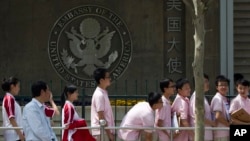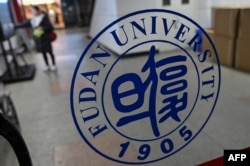Student Union
- By Dylan Ebs
International students find community during Pride Month

For LGBTQ+ international students, Pride Month, observed in June, is a unique time to reflect.
They hold on to multiple identities — both their LGBTQ+ identity and their cultural background — but coming to terms with them is not always easy.
For graduate student David Zhou, these identities can feel conflicting as transgender rights in China remain a controversial issue and spaces for LGBTQ people close. Zhou, 25, is transgender and pursuing an education in the STEM field at an urban university in the Midwestern United States.
VOA is using a pseudonym for Zhou’s first name and is not naming his university to protect his identity due to safety concerns back home in China. Zhou is not open about his transgender identity to his family.
During Pride Month, Zhou said he attended multiple LGBTQ+ events in his community and is surrounded by a supportive group of LGBTQ+ students who can relate to his experiences. But he’s not open about his identity to everyone on campus and said he doesn’t disclose his preferred pronouns to everyone to avoid transphobic comments.
“I feel like I have to make some judgments of the character of that person to see if they’re a good person to disclose [my identity] to,” Zhou said.
Zhou’s Pride Month celebrations included attending local markets with LGBTQ+ vendors and hanging out with his LGBTQ+ friends.
“They normalized being trans and for a long time I feel like trans identity is, should I say a vulnerability, brings me fear and worrying about discrimination, but having those events are helpful because it allowed me to see that queer people could just [live] openly,” he said.
At social events where few international students are present, Zhou said it can be tough to fit in.
“There's a lot of times like when they were talking about things I kind of, don't really understand, mostly because I kind of lack some background experience or knowledge,” he said.
Zhou said he is not aware of specific groups for LGBTQ+ international students at his university, but said international students are more prevalent in graduate programs and therefore find representation in organizations for LGBTQ+ graduate students.
In China, transgender individuals must obtain consent from an “immediate family member,” even for adults hoping to transition, which critics say limits the autonomy of transgender individuals while supporters say the policy protects doctors from violence by upset parents.
Struby Struble, a former coordinator of the University of Missouri LGBTQ+ Resource Center, told NAFSA: Association of International Educators in 2015 that LGBTQ+ international students face a “double barrier” on campus.
“With their international student friends, they feel isolated because they’re the LGBT one,” she said. “But then among the LGBT students on campus, they feel isolated because they’re the international one.”
Nick Martin, associate director of the Q Center, Binghamton University’s LGBTQ+ student support office, said when international students tour the center, there’s often a sense of hesitation as they enter a type of space that may not be present in their home country.
“I compare that to a year in after they've come into the space, they've again, maybe come to some of our events, they've got more connected,” he said.
Martin said graduate students have a unique interest in the Q Center as they may use the office for research and advocacy purposes that align with their studies.
“For older students, there may be hesitancy in a different way, but I think it's more in the vein of they want to do some of the advocacy work,” he said.
Martin said he thinks about how both his office and BU’s international student office can support students who come from countries with few — if any — protections for LGBTQ+ individuals.
“It's been a learning process of what those students really need, but I think I've kind of learned that a lot of students are just looking for the safe space that we offer,” Martin said.
- By VOA News
International students discuss US campus culture shock

International students at De Anza College in Cupertino, California, talked about culture shock in an article in La Voz News, the student newspaper.
"It felt like a major culture shock. Everything was so different, from academics to mannerism," said a student from Mexico.
Read the full story here.
These are the most expensive schools in the US
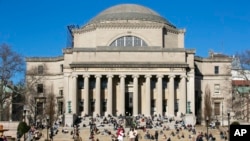
High tuition costs along with housing and food expenses can add up for students at U.S. colleges and universities.
MSNBC looked at the most expensive schools in the country, with one costing more than $500,000 for a bachelor’s degree. (June 2024)
Uzbekistan students admitted into top US universities
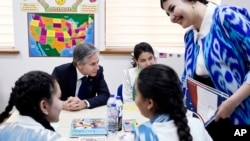
Students from Uzbekistan are among the international students admitted to top colleges and universities in recent years.
Gazata.uz profiled some of the Uzbekistan students attending Harvard, Brown, Princeton and other U.S. universities. (June 2024)
- By Stella Hsu
Reports of visa checks, deportations worry Chinese STEM students in US
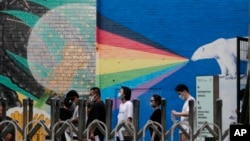
Geopolitical tensions and growing competition in tech between the United States and China appear to be spilling over into academia despite commitments from the world’s two biggest economies to boost people-to-people exchanges.
The United States remains the top choice for Chinese students seeking to study abroad with nearly 300,000 studying in American colleges and universities during the 2022-2023 school year. But reports of some cases that students and professors are facing extra scrutiny while passing through immigration and the deportation of others are raising concerns.
For Chen Xiaojin, a doctoral student studying semiconductor materials at a university in the Washington, D.C., metropolitan area, it has been six years since she returned to her hometown of Beijing.
At first, it was the COVID-19 pandemic that kept her from going home. But over the past two years, she has been deterred by accounts of Chinese students majoring in science and engineering being required to reapply for their visas upon returning to China.
She also says she is worried by reports over the past six months of Chinese students being deported, even at nearby Dulles Airport.
"My current research is relatively sensitive, and my boss [adviser] is getting funds from the U.S. Department of Defense, making it even more sensitive,” she told VOA. "I am afraid that I won't be able to return after I go back [to China]."
Chen says that if she did return to China, she would have to apply for a new visa.
In a report late last month, Bloomberg said it had found at least 20 Chinese students and scholars with valid visas who were deported at U.S. Customs since November and barred from reentry. The U.S. Customs and Border Protection Agency does not release relevant data.
Immigration attorney Dan Berger represented one Chinese student who was deported late last year. He tells VOA Mandarin that the student studied biological sciences at Yale University and was about to complete her doctorate.
She visited her family in China and got a new visa but was deported by customs at Dulles Airport and barred from reentering the country for five years. Berger said he did not see anything suspicious in the transcript of the conversation between the student and the customs officer.
"We have seen what seems like a pattern over the last six months of Chinese PhD students being turned around…. more than I've seen in quite a while," he said.
Matthew Brazil, a fellow at the Jamestown Foundation, said neither country seems willing to explain the situation. However, he believes that in most cases, the United States must have valid reasons for blocking visa holders from entering the country.
In some cases, the student’s background may not match what is written on the visa application. In other cases, customs agents may also find something that the State Department missed, and once they see it, they are responsible for taking action.
"I wish the Chinese side would be specific about their students who were refused entry,” he said. “The fact that both sides are mum on details and that the Chinese side is engaged with the usual angry rhetoric means that each has security concerns. And that says to me that there was good reason for the U.S. to stop these particular applicants."
Brazil also sees a connection between the entry denials and export control regulations issued by the United States in October 2022 that restrict China's ability to obtain advanced computing chips, develop and maintain supercomputers, and manufacture advanced semiconductors.
U.S. Customs and Border Protection is one of the law enforcement agencies authorized to investigate violations of export control regulations, he said.
"Beijing's intelligence agencies are known to focus attention on PRC [People's Republic of China] students and scientists headed abroad who study or work on dual-use technologies controlled under the Export Administration Act — compelling Chinese students and scientists to report on what they've learned when they return to China on holiday,” he said. “This has been true for decades."
Bill Drexel, a fellow for the Technology and National Security Program at the Center for a New American Security, said the U.S. government did find some cases where students tried to steal strategic technology for China.
"I think it would both not be surprising that they found some really questionable or incriminating evidence for some students,” he said. “It would also not be surprising if, in their hunt for really solid evidence, they also may have made some mistakes on other students.”
Drexel adds that “it’s just kind of an unfortunate fact of the time that we live in and the tactics that the CCP uses when it comes to these measures."
In a post on X in early May, U.S. ambassador to China Nicholas Burns tried to dispel concerns about visas and entry to the United States for students and scholars. In the post, he said "99.9% of Chinese students holding visas encounter no issues upon entering the United States.”
In an interview with The Wall Street Journal Monday, Burns said it is China that is making it impossible to promote people-to-people ties. Burns told the Journal that students attending events sponsored by the United States in China have been interrogated and intimidated.
He also said that since U.S. President Joe Biden and China’s leader Xi Jinping held their summit in San Francisco last year, China’s Ministry of State Security and other agencies had interfered with Chinese citizens’ participation at some 61 events.
At a regular briefing on Wednesday, Chinese Foreign Ministry spokesperson Mao Ning dismissed those accusations, saying that they did not “reflect reality" and that went against key understandings reached by both countries’ presidents in San Francisco.
“The United States, under the pretext of 'national security,' unjustifiably harasses, interrogates, and deports Chinese students in the U.S., causing them significant harm and creating a severe chilling effect,” Mao said. “The image of the United States in the minds of the Chinese people fundamentally depends on the actions of the United States itself.”
Drexel said he believes Burns’ comments about visas and students' willingness to study in the U.S. still ring true.
“On balance, it's still the case that American universities are overwhelmingly warm towards Chinese students and want them in large numbers," he said.
However, Berger, the immigration lawyer, is concerned about the chilling effect recent cases involving Chinese students could have.
"In general, we are being more careful about advising Chinese graduate students in STEM fields about traveling and letting them know that there is some small risk,” he said.
Even though the risk is small, it does seem to be real at the moment, he said.
Adrianna Zhang contributed to this report.
US federal judge blocks new regulation targeting for-profit colleges
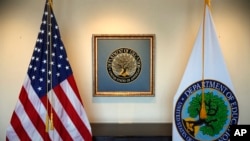
A federal judge in Texas has blocked a regulatory provision targeting for-profit colleges that was scheduled to take effect in July 2024.
Times Higher Education reports that the rule, which would affect student loans, was challenged by for-profit institutions. (June 2024)
- By Bo Gu
Decline of American students in China could mean fewer experts
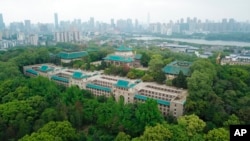
The number of Americans studying in China has dropped dramatically in recent years from around 11,000 in 2019 to 800 this year, and the slump is so bad that some China scholars worry the United States could lose a generation of "China experts" as a result.
David Moser, an American who has lived and worked in China for more than three decades and is the former academic director of China Educational Tours (CET) in Beijing, said that “I haven’t seen an American student in years.”
CET, which was launched in 1982, is a Washington-based organization that recruits American students for short-term language and culture studies in China. Moser said that his position as academic director recently went away and that the organization continues to struggle to get more students to return to China.
CET once carried out short-term study-abroad programs in several cities in China, including Beijing, Shanghai, Harbin and Hangzhou. Now, the program is only available in Beijing and Shanghai. Harbin's page on the website shows that programs are "suspended until spring 2025."
"We have already lost a very crucial generation who would need to be continuing right now in China with studies or whatever,” Moser said, “so that 10 years from now, they would already be ... very experienced China hands [experts].”
During the 2011-12 school year, the number of American students in China was around 15,000. Since then, with Xi Jinping’s rise as China’s leader and growing frictions between the two countries, the number has declined, dropping dramatically after the pandemic to about 200 at its lowest point.
Loss of understanding
Moser said the lack of talented people who understand China is undoubtedly a huge loss for the United States.
"You really need people who understand the two academic systems, the two college systems, and the way these things work in order to not make a huge mistake,” he said.
Compared with China, however, CET's projects in Taiwan are in full swing.
Moser said CET started its first summer study abroad program at National Taiwan University in 2022, which attracted more than 120 American students. He said a program was set up in Taiwan because too few American students wanted to go to China.
He said he believed that starting around 2008, when Beijing held its first Olympics, China’s pollution and human rights violations turned some American students away, and that the trend has not reversed.
China's strict lockdown during the COVID-19 pandemic was also a crucial turning point. At that time, many foreigners, including American students, left China. After the Chinese government suddenly lifted the lockdown at the end of 2022, most foreigners did not immediately return.
China's increasingly aggressive posture on the international stage under Xi, and its hostile propaganda against the West at home, is likely to have prevented foreign talents from visiting China for cultural and business exchanges.
A revised counterespionage law that took effect on July 1, 2023, has also made many Americans hesitant to travel to China, let alone study there.
As U.S.-China relations deteriorate, official academic exchanges have also been coldly received. Former U.S. President Donald Trump suspended all Fulbright exchange programs to China and Hong Kong in July 2020.
After the counterespionage law negatively affected China, the Chinese government sought to extend goodwill at the level of people-to-people exchanges. Xi announced during the Asia-Pacific Economic Cooperation meeting in San Francisco in November 2023, "In order to expand exchanges between the people of China and the United States, especially the younger generation, China is willing to invite 50,000 American young people to come to China for exchanges and studies in the next five years."
High school students visit
In January 2024, more than 20 students from Muscatine High School in Iowa visited Beijing, Hebei and Shanghai. In March, 24 students from Lincoln High School and Steilacoom High School in Washington state also boarded a plane from San Francisco to Beijing.
Wenzhou University and Kean University in New Jersey signed an agreement to jointly establish Wenzhou-Kean University in May 2006. At the time, Xi was the party secretary of Zhejiang, home province of Wenzhou, and he attended the signing ceremony in 2006.
In a letter to Kean's president on June 7, Xi encouraged universities in the two countries to strengthen exchanges and cooperation. However, three days later, four American teachers who were giving short-term courses at Beihua University in Jilin, China, were stabbed by a Chinese man. Chinese officials quickly deleted the relevant content on social media, and a Ministry of Foreign Affairs spokesperson called the incident an "accident" that would not affect relations between the two countries.
Meghan Burke, a former sociology professor at Illinois Wesleyan University, said that although the attack on American teachers was a shocking and unexpected incident, she still hoped that it would not affect Americans' confidence in studying and traveling in China.
"I think it's always been there, but I think with the pandemic, there was some really racially loaded misinformation and fears that I wouldn't be surprised if that came into play in some students' and some families' decisions about where they were willing to go abroad," she said.
Asked about the 800 American students in China today, Burke said that was a big regret for the United States.
"Language is key to understanding culture. So, any limitations on learning Mandarin or other Chinese languages only hold back our ability to have a broader and more complex intercultural understanding and international perspective that I think benefits everyone who is involved in those conversations," Burke said.
In contrast, 300,000 Chinese students are studying in the United States.
"Asymmetry is bad for China, but it's much worse for the United States because asymmetry is in one direction, which is towards us,” Moser said. “The Chinese have very good knowledge of the U.S., of its culture, of its government, everything."
Adrianna Zhang contributed to this report.
- By VOA News
Campus protests cause some students to rethink US colleges
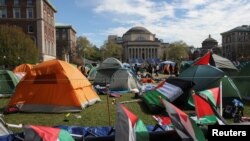
Campus protests at U.S. colleges, and the accompanying unrest and violence, are causing some international students to rethink their plans to study in the United States.
Writing in the Straits Times, Vihanya Rakshika reports that safety concerns are motivating parents to look elsewhere for their children’s higher education. (June 2024)
- By VOA News
Which schools have biggest alumni networks?
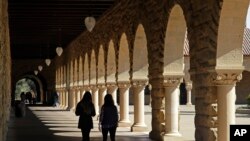
In addition to considering the cost and reputation of a school, prospective students should consider alumni networks – connected graduates who can help with the job search once classes are complete.
Writing in University Magazine, Anwar Abdi takes a look at the 25 U.S. universities with the largest alumni networks. (June 2024)
- By VOA News
Report: Number of college dropouts remains high
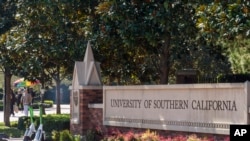
Enrollment in U.S. colleges and universities is increasing, but the number of dropouts remains high, according to a report in the Chronicle of High Education.
Amanda Friedman writes that more former students are returning to school, but many want shorter-term programs, such as certificate programs. (June 2024)
- By VOA News
Xi wants more exchanges between US, Chinese universities
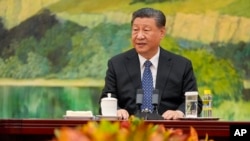
Mutual understanding between China and the United States can be improved by having more university exchanges between the two countries.
According to Bloomberg, Chinese President Xi Jinpin told Xinhua News Agency that exchanges could develop young ambassadors who understand both countries. (June 2024)
- By VOA News
Students learn protests can affect job prospects
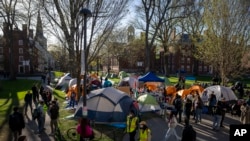
Some students in the U.S. are learning their public stances on the Israel-Hamas war are having an impact on job prospects.
Financial Times reports that protest activities are turning up in background checks, and employers have revoked employment offers to students as a result. (June 2024)
UCLA names new chancellor as campus is still reeling from protests over Israel-Hamas war
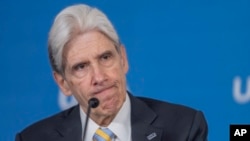
The president of the University of Miami was chosen Wednesday to become the next chancellor of the University of California, Los Angeles, where the retiring incumbent leaves a campus roiled by protests over Israel's war against Hamas in Gaza.
Dr. Julio Frenk, a Mexico City-born global public health researcher, was selected by regents of the University of California system at a meeting on the UCLA campus, where there were a swarm of security officers.
Frenk will succeed Gene Block, who has been chancellor for 17 years and announced his planned retirement long before UCLA became a national flashpoint for U.S. campus protests. This spring, pro-Palestinian encampments were built and cleared by police with many arrests, and again this week, there were more arrests.
Frenk has led the 17,000-student University of Miami since 2015 and previously served as dean of the Harvard T.H. Chan School of Public Health and as Mexico's national health secretary, among other positions.
In a brief press conference, Frenk said he was approaching the appointment with excitement and humility.
"The first thing I plan to do is listen very carefully," Frenk said. "This is a complex organization. It is, as I mentioned, a really consequential moment in the history of higher education."
Frenk did not comment on specific protests at UCLA this spring or the current administration's response, which initially tolerated an encampment but ultimately used police to clear it and keep new camps from forming.
During public comment in the regents meeting, speakers criticized UC administrators, alleged police brutality, complained of a lack of transparency in UC endowments and called for divestment from companies with ties to Israel or in weapons manufacturing.
Speakers also talked about experiencing antisemitism on campus and called for an increased law enforcement response to protesters.
Later, about 200 people rallied, including members of an academic student workers union and the Faculty for Justice for Palestine group as well as students from other UC campuses. Participants held signs calling for charges to be dropped against protesters who have been arrested.
Block departs UCLA on July 31. Darnell Hunt, executive vice president and provost, will serve as interim chancellor until Frenk becomes UCLA's seventh chancellor on January 1, 2025.
In previous roles, Frenk was founding director of Mexico's National Institute of Public Health, held positions at the World Health Organization and the nonprofit Mexican Health Foundation, and was a senior fellow with the Bill and Melinda Gates Foundation's global health program.
Frenk received his medical degree from the National University of Mexico in 1979. He then attended the University of Michigan, where he earned master's degrees in public health and sociology, and a joint doctorate in medical care organization and sociology.
- By VOA News
Experts: US will have nearly 2 million international students by 2034
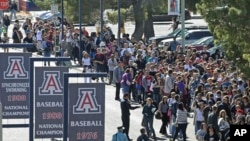
Experts predict the U.S. will enroll nearly 1.8 million international students by 2034, ICEF Monitor reports.
Most of the students will hail from India, along with China, Vietnam, Nigeria, Bangladesh, Nepal, Brazil and Mexico, the analysis says.
Read the story here. (May 2024)
- By VOA News
UCLA gets its first international student undergraduate council president
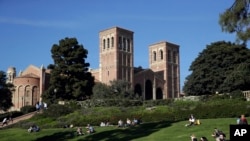
An international student will lead the Undergraduate Students Association Council at UCLA for the first time.
Adam Tfayli, who is from Lebanon, won the presidential race, beating out five other candidates.
Student newspaper the Daily Bruin has the story here. (May 2024)





